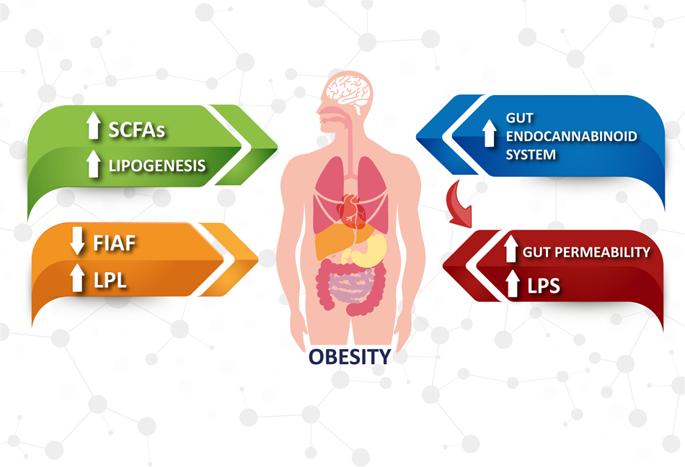International Journal of Obesity Supplements Pub Date : 2019-04-12 , DOI: 10.1038/s41367-019-0011-7
Giovanna Muscogiuri , , Elena Cantone , Sara Cassarano , Dario Tuccinardi , Luigi Barrea , Silvia Savastano , Annamaria Colao

|
Obesity is a multifactorial disease resulting in excessive accumulation of adipose tissue. Over the last decade, growing evidence has identified the gut microbiota as a potential factor in the pathophysiology of both obesity and the related metabolic disorders. The gut microbiota is known to protect gastrointestinal mucosa permeability and to regulate the fermentation and absorption of dietary polysaccharides, perhaps explaining its importance in the regulation of fat accumulation and the resultant obesity. The proposed mechanisms by which the gut microbiota could contribute to the pathogenesis of obesity and the related metabolic diseases include: (a) a high abundance of bacteria that ferment carbohydrates, leading to increased rates of short-chain fatty acid (SCFA) biosynthesis, providing an extra source of energy for the host, that is eventually stored as lipids or glucose; (b) increased intestinal permeability to bacterial lipopolysaccharides (LPS), resulting in elevated systemic LPS levels that aggravate low-grade inflammation and insulin resistance; (c) increased activity of the gut endocannabinoid system. Fecal transplantation studies in germ-free mice have provided crucial insights into the potential causative role of the gut microbiota in the development of obesity and obesity-related disorders. Diet +/− bariatric surgery have been reported to modulate the gut microbiota, leading to lean host phenotype body composition. This review aims to report clinical evidence for a link of the gut microbiota with human obesity and obesity-related diseases, to provide molecular insights into these associations, and to address the effect of diet and bariatric surgery on the gut microbiota, including colonic microbiota, as a potential mechanism for promoting weight loss.
中文翻译:

肠道菌群:治疗肥胖的新途径
肥胖是导致脂肪组织过度积聚的多因素疾病。在过去的十年中,越来越多的证据表明肠道菌群是肥胖症和相关代谢异常的病理生理学的潜在因素。众所周知,肠道菌群可以保护肠胃黏膜的通透性,并调节膳食多糖的发酵和吸收,这也许可以解释其在调节脂肪积累和肥胖症中的重要性。肠道微生物群可能导致肥胖症和相关代谢疾病的机制包括:(a)大量发酵碳水化合物的细菌,导致短链脂肪酸(SCFA)生物合成的速率增加,主机的额外能源,最终以脂质或葡萄糖的形式存储;(b)肠道对细菌脂多糖(LPS)的通透性增加,导致全身LPS水平升高,加剧了低度炎症和胰岛素抵抗;(c)肠内大麻素系统的活性增加。在无菌小鼠中进行的粪便移植研究已对肠道菌群在肥胖症和与肥胖相关的疾病发展中的潜在致病作用提供了重要的见解。据报道,饮食减肥手术会调节肠道菌群,从而导致瘦的宿主表型身体组成。这篇综述旨在报告肠道微生物群与人类肥胖症和肥胖症相关疾病之间的联系的临床证据,以提供有关这些关联的分子见解,































 京公网安备 11010802027423号
京公网安备 11010802027423号